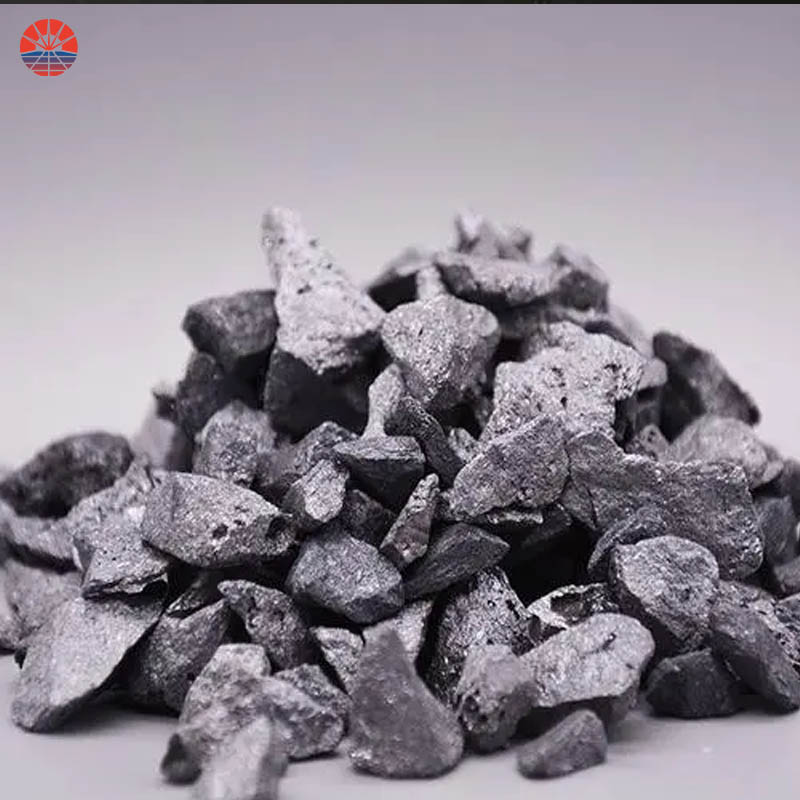China Ferrosilicon Powder Manufacturers
Using ferrosilicon in the foundry industry provides several benefits that improve the casting process and the quality of the final castings. Some of the main advantages of using ferrosilicon in the foundry industry include:
Inoculation: One of the key benefits of using ferrosilicon in foundries is its role as an inoculant. Inoculation is a process that promotes the formation of fine graphite flakes in cast iron, which enhances the mechanical properties of the castings. Ferrosilicon, with its high silicon content, facilitates the controlled formation of graphite, leading to improved strength, hardness, and wear resistance in the cast iron.
Nodularization: Ferrosilicon is also used in foundries for nodularizing cast iron. The addition of ferrosilicon with magnesium (FeSiMg) initiates the formation of graphite nodules, transforming the cast iron into ductile iron or nodular cast iron. This nodularization process imparts superior mechanical properties, such as increased ductility, toughness, and impact resistance, making the castings less brittle and more suitable for a wide range of applications.
Grain refinement: Ferrosilicon can help refine the grain structure of metals during solidification. This leads to finer and more uniform grain sizes, which can improve the mechanical properties of the castings, such as increased strength, hardness, and fatigue resistance.
Deoxidation: Ferrosilicon, with its high silicon content, is used as a deoxidizing agent in foundry applications. It reacts with oxygen in the molten metal, forming silicon dioxide (SiO2) and carbon monoxide (CO) gas. Deoxidation removes oxygen from the melt, reducing the risk of porosity and other defects in the castings, resulting in higher-quality castings.
Cost-effectiveness: Ferrosilicon is a cost-effective additive in the foundry industry. Its availability and affordability make it a preferred choice for achieving desired material properties in castings without significantly increasing production costs.
Improved machinability: The use of ferrosilicon in the foundry industry can lead to improved machinability of the castings. Fine-grained structures and well-controlled graphite formation contribute to easier machining and better surface finishes.
Versatility: Ferrosilicon can be used in various foundry applications, including both grey iron and ductile iron casting processes. Its versatility allows foundries to tailor the material properties of castings to meet specific requirements for different applications and industries.
Overall, the use of ferrosilicon in the foundry industry helps produce high-quality castings with improved mechanical properties, making it a valuable and versatile additive in various foundry processes. It contributes to enhancing the performance, reliability, and cost-effectiveness of castings used in automotive, construction, machinery, and other sectors.
What's The Ferrosilicon Usage In Foundry Industry
In the foundry industry, ferrosilicon is used as a valuable additive to improve the casting process and the properties of the cast metal. It serves multiple purposes and offers several benefits, making it a widely utilized material. Here's how ferrosilicon is used in the foundry industry:
Inoculation and Nodularization: One of the primary uses of ferrosilicon in foundries is as an inoculant and nodularizer. Inoculation involves the addition of small amounts of ferrosilicon to molten metal to promote the formation of desirable graphite structures. This helps to refine the grain structure, reduce the risk of shrinkage defects, and improve the mechanical properties of the cast metal.
Nodularization, which is a specific form of inoculation, is used in the production of ductile iron. Ferrosilicon is added to molten iron to induce the formation of graphite nodules instead of flakes, resulting in ductile iron with improved strength, ductility, and fracture toughness.
Desulphurization: Ferrosilicon is also used as a desulphurizing agent in the foundry industry. When added to molten metal, it reacts with sulfur present in the metal, forming iron sulfides that float to the surface as slag. This helps reduce the sulfur content in the final cast product, which is essential for certain applications, especially where sulfur is detrimental to the metal's properties.
Modifying Alloy Properties: Ferrosilicon can be used as an alloying agent to modify the properties of the cast metal. For example, it can be added to various alloys to enhance their strength, wear resistance, and other mechanical characteristics.
Inclusions Control: The addition of ferrosilicon in certain casting processes helps control the formation of undesirable inclusions in the metal, improving the quality and purity of the final cast product.
Reducing Oxidation: When used in certain casting methods, ferrosilicon can help reduce the oxidation of molten metal, preventing the formation of oxides that can degrade the casting quality.
Counteract Tramp Elements: Ferrosilicon can be used to counteract the effects of certain impurities or tramp elements in the metal, improving its overall quality and suitability for specific applications.
It's important to note that the specific usage and composition of ferrosilicon in the foundry industry may vary depending on the type of metal being cast, the casting process employed, and the desired properties of the final product. The proper selection and control of ferrosilicon additions are crucial in achieving high-quality castings with consistent mechanical properties.
Specification
Quality inspection certificate of finished product | |||
Product name | Ferro Silicon | Batch No. | ZC2023-06-13 |
Sampling Site | / | Product specifications | / |
Acceptance date | 2023.06.13 | Report date | 2023.06.14 |
Test items | SH/T 0313-92 | Test results | |
Appearance | This product should be black solid | ||
Si | 75.32 | ||
c | 0.11 | ||
P | 0.03 | ||
s | 0.014 | ||
A1 | 0.77 | ||
Conclusion | Product conforms to specification. | ||








